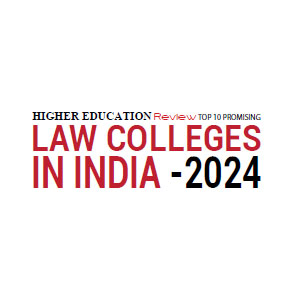Cover Story
Top 10 Promising Law Colleges in India - 2024
Law education in India offers a dynamic and multifaceted approach to legal studies, equipping students with the necessary skills for analyzing and projecting the complex legal situation at present. To say that there has never been such a strong demand for skillful legal professionals as now in India-the largest democracy and the abode of the rapidly developing economy-is probably not an exaggeration. This demand has compelled law colleges across the country to impart rigorous academic training, practical exposure, and specialized courses addressing both national and international legal challenges. Indian law colleges offer a wide range of programs, from undergraduate levels as BA LLB, BBA LLB, Post- Graduate options include LLM, specialized Diplomas and research degrees. In many instances, the curriculum includes classic law subjects such as constitutional law, criminal law, civil procedure, and contract law, among others. It may also include contemporary issues, among them intellectual property rights, cyber law, environmental law, human rights, and alternative means of dispute resolution. Many law colleges have included practical training through moot court competitions, internships, legal aid clinics, and interactions with legal professionals so that students are adequately prepared when they face real-world legal challenges.
At present, Indian law colleges produce a vastly greater number than just lawyers for courtroom litigation, though the subjects include extremely specialized ones like corporate governance and international business laws on technology, etc. This is legal tech, still an emerging field that some institutions offer courses in tech combined with law, most preparation students can expect for working in the emergent intersection of these two fields. This trend is very powerful in interdisciplinary legal education since more and more law colleges are encouraging the pursuit of joint degrees or dual programs in business administration, political science, economics, or social sciences; a broader perspective is always valued while addressing legal issues.
Indian law colleges are growing increasingly with a global focus. Many have exchange programs, collaborations with international institutions, and exposure to global legal practices. This shift will help equip students to handle cross-border legal issues that have become more increasingly common due to globalization. This student body becomes the backbone of law colleges in India, providing support to the country’s legal framework, corporate world, and public policy, while taking part in an ever-growing global legal discourse, in 2024.
Higher Education Review magazine in this issue presents spotlight of ‘Top 10 Promising Law Colleges in India - 2024’ featuring institutions that have been in the educational field for almost a century and are offering best class education in the country. The following list has been prepared after being closely scrutinized by a distinguished panel of judges including CXOs, analysts and our editorial board.
Top 10 Promising Law Colleges in India - 2024
College Logo |
College |
Management |
Description |
|---|---|---|---|

|
Bhaskar Law College
Hyderabad
|
Dr S V Sreekanth, Principal | Offers comprehensive legal education with a strong focus on practical training, ethical values, and academic excellence, preparing students for successful legal careers |

|
Hindustan Institute of Technology and Science - School of Law
Chennai
|
Dr Anand Jacob Verghese, Chancellor | From the very beginning, the institution places significant emphasis on |

|
IFIM School of Law
Bengaluru
|
Dr. Aswini Patro, Principal and Professor | Offers a dynamic, practical legal education, blending academic excellence with real-world exposure to prepare students for successful legal careers |

|
Indian Institute of Technology
Kharagpur
|
Prof. Virendra Kumar Tewari, Director | Engaged in a steady process of development with about 27 academic departments and schools, 7 centres of excellence, given the status of an autonomous University |

|
Nalsar University of Law
Hyderabad
|
Prof. Srikrishna Deva Rao, Vice Chancellor | Committed to the creation of an ethical legal culture, which protects and promotes the rule of law, believes that the cause of building a rule of law society is a continuous enterprise, which is sustainable if it is undertaken with optimism and good cheer |

|
National Law School of India University
Bangalore
|
Prof. (Dr.) Sudhir Krishnaswamy, Vice Chancellor | One of the first institutions in the country to introduce the five-year integrated law degree at the undergraduate level, over 30 years now, the University has irrefutably remained a leader in the field of legal education in the country |

|
National Law University
Delhi
|
Justice Manmohan, Chancellor | The primary objective of the University is to evolve and impart comprehensive and interdisciplinary legal education that is socially relevant, aim to promote legal and ethical values and foster the rule of law and the objectives enshrined in the Constitution of India |

|
Shri Vaishnav Institute of Law
Indore
|
Dr. Upinder Dhar, Vice Chancellor | Offer a range of undergraduate, postgraduate, and diploma programs designed to equip students with comprehensive legal knowledge and practical skills |

|
SNBP Law College
Pune
|
Dr. Rutuja Bhosale, Director | Excels in legal education with comprehensive programs, practical training, qualified faculty, and modern infrastructure, fostering future legal professionals |

|
The West Bengal National University of Juridical Sciences
Kolkata
|
Dr Justice D Y Chandrachud, Chancellor | One of the best amongst the elite national law schools in India built on the five-year law degree model proposed and implemented by the Bar Council of India, offers a five-year integrated B.A./BSc. LLB (Hons.) degree programme at the undergraduate level and a Master of Laws (LLM) programme at the postgraduate level |




